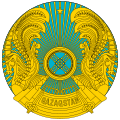
Nursultan Abishuly Nazarbayev is a Kazakh politician and military officer who served as the first President of Kazakhstan, from the country’s independence in 1991 until his formal resignation in 2019, and as the Chairman of the Security Council of Kazakhstan from 1991 to 2022.
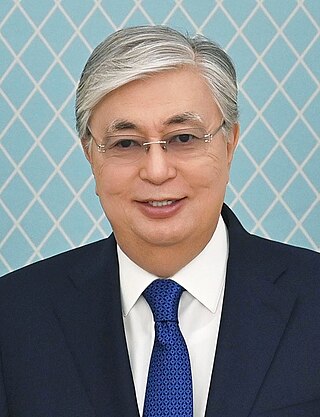
Kassym-Jomart Kemeluly Tokayev is a Kazakh politician and diplomat who has served as President of Kazakhstan since 2019. Between 20 March and 12 June 2019, he served as acting president after the resignation of Nursultan Nazarbayev, who had been president for nearly three decades.

Rakhat Mukhtaruly Aliyev was a senior official of the government of Kazakhstan who died in an Austrian prison awaiting trial on charges of murder. His trial was planned to start in Vienna in first half of year 2015. Austrian legal circles were giving much attention to this high-profile criminal case in which a former diplomat was facing murder charges.

The president of the Republic of Kazakhstan is the head of state of the Republic of Kazakhstan and the commander-in-chief of the Armed Forces of the Republic of Kazakhstan. The president is the holder of the highest office within the Republic of Kazakhstan. The powers of this position are described in a special section of the Constitution of Kazakhstan.
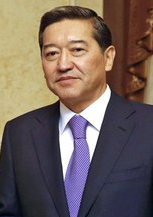
Serik Nyghmetuly Akhmetov was a Prime Minister of Kazakhstan from 2012 to 2014. He served as the Minister of Defense from April to October 2014.
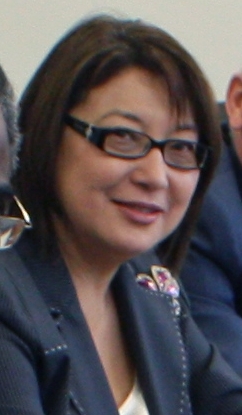
Byrganym Saryqyzy Aitimova is a Kazakh politician and diplomat who was a member of the Kazakh Senate from 2013 to 2019 and in 1996. She served as the Ambassador of Kazakhstan to the United Nations, Cuba, and Solomon Islands concurrently from 2007 to 2013. Prior to her appointment as UN ambassador, she was the Deputy Prime Minister of Kazakhstan from 2004 to 2005 and then the Minister of Education and Science until Zhanseit Tuymenbayev replaced her on 10 January 2007. She served as Kazakhstan's Ambassador to Italy from 2002 to 2004, and ambassador to Israel from 1996 to 2002.

Ahmedjan Smagululy Essimov is a Kazakh politician who's served as the chairman of Samruk-Kazyna from 2017 to 2021. Prior to that, he was the director of Expo 2017 from 2015 to 2017, akim of Almaty from 2008 to 2015, Minister of Agriculture from 2006 to 2008 and 2001 to 2004, Deputy Prime Minister of Kazakhstan from 2002 to 2006 and 1994 to 1996, First Deputy Prime Minister of Kazakhstan from 1996 to 1998, Acting Head of the Presidential Administration of Kazakhstan and State Secretary of Kazakhstan in 1996.
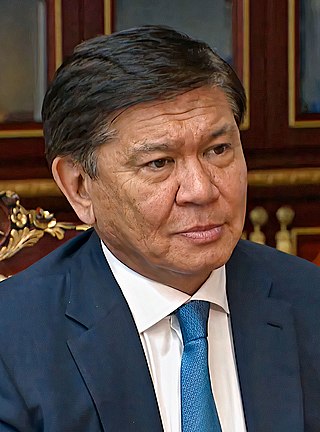
Ermukhamet Qabidenuly Ertisbaev is a Kazakh politician and diplomat who has served as the chairman of the People's Party of Kazakhstan since 27 March 2022. Prior to that, he served as the Kazakh ambassador to Belarus from November 2017 to August 2019 and to Georgia from April 2013 to November 2017.

Amanat, previously known as Nur Otan until 2022, is a political party in Kazakhstan. Being the largest to date, it has been the ruling party of the country from 1999, with a membership claiming to be of over 762,000 people in 2007. Amanat has been led by Erlan Qoşanov since 26 April 2022.

The following outline is provided as an overview of and topical guide to Kazakhstan:

Snap presidential elections were held in Kazakhstan on 26 April 2015 to elect the President of Kazakhstan. This was the fifth presidential election held and second without having any formal opposition candidates. With the highest-ever nationwide turnout of 95.2%, the result was a victory for long-term incumbent President Nursultan Nazarbayev of Nur Otan who received 97.8% of the vote, the largest since 1991, thus winning a fifth term in office while his closest challenger, Turgyn Syzdyqov, received only 1.6% of the votes.

Independence Day of Kazakhstan (Kazakh: Қазақстан Республикасының Тәуелсіздік күні,is the main national holiday in the Republic of Kazakhstan, celebrated annually on 16 December.

The Aibyn Presidential Regiment of the State Security Service of Kazakhstan is a ceremonial honor guard of the State Security Service of Kazakhstan. It is comparable to the Kremlin Regiment in Russia and the Azerbaijani National Guard.

Snap presidential elections were held in Kazakhstan on 9 June 2019 to elect the President of Kazakhstan following the resignation of long-term President Nursultan Nazarbayev in March 2019. This was the sixth presidential election held since Kazakhstan's independence. The elections were not free and fair, and were widely denounced as a sham. Acting president Kassym-Jomart Tokayev of Nur Otan won the election.

The Order of the First President of Kazakhstan – Leader of the Nation Nursultan Nazarbayev, also referred to simply as the Order of Nazarbayev, is a state award of the Republic of Kazakhstan. It was established on 1 January 2001 in honor of President Nursultan Nazarbayev who was at the time, the first and only President of Kazakhstan.
Military Courts of the Republic of Kazakhstan are the specialized courts of the Armed Forces of Kazakhstan that deal with criminal cases concerning military personnel and the civilian personnel of the Ministry of Defence. The military courts are part of the judiciary of Kazakhstan. It is often noted as a common criticism that military courts generally have more connection to the government than other courts by virtue of going through the military hierarchy, which has been seen as a threat to judicial independence. Military courts consider civil cases by active servicemen or citizens who undergo military training against their will, among other things.
Jaqsylyq Aqmyrzauly Dosqaliev is a Kazakh politician who served as a Minister of Healthcare twice from October 2001 to April 2004 and November 2008 to October 2010.

The Special Forces of Kazakhstan trace their history to the Soviet era spetsnaz units operating on the territory of the Kazakh Soviet Socialist Republic within the USSR. These units are the remnants of the former Soviet Army, KGB, the Ministry of Internal Affairs and GRU. Similarly to other post-Soviet states, Kazakhstan's special forces fall under the control of the Armed Forces of the Republic, the Ministry of Interior, and under the National Security Committee.

Presidency of Kassym-Jomart Tokayev began on 20 March 2019, when he assumed office shortly after resignation long-time President Nursultan Nazarbayev; as a Senate Chairman, Tokayev became the Presidential Designate in accordance to the Constitution and would serve as an acting head of state. After declaring snap presidential elections Tokayev, endorsed by Nazarbayev, become the candidate for the ruling Nur Otan party and swept 71% of the vote in the race, thus becoming officially the 2nd President of Kazakhstan. After being inaugurated on 12 June 2019, Tokayev pledged to uphold many of the previous policies by Nazarbayev and at the same time, continue and accelerate social and political reforms.

A constitutional referendum in Kazakhstan, locally called the Republican referendum, was held on 5 June 2022. It was the third referendum since Kazakhstan's independence in 1991, and the first since the 1995 referendum that established the current constitution. The amendments followed violent civil unrest in early January caused by worsening economic conditions and subsequent calls for rapid political reform. The referendum changed 33 of the document's 98 articles. Political commentators assessed that amendments would lessen the influence of the executive branch, grant more powers to the Parliament, and eliminate the powers that former president Nursultan Nazarbayev had retained after resigning from office in 2019.

